|
|
 |
==Even more than most centuries,
this one feels impossibly crowded-- and too near for
perspective. I'll simply note a few particularly
evocative people and events; for more material, see *Sources
of
Indian Traditions*; *Columbia Univ.*; and the *modern maps*. |
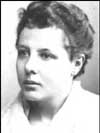 |
==Annie Besant (1847-1933),
converted to Theosophy by Madame Blavatsky, comes to
live in India to pursue her mystical studies (on *forms of yoga*; see also her *book on yoga*), and thinks of
herself as an Indian ( see her *autobiography*). She works
energetically for Indian Home Rule (*The Case for India*), is interned
during World War I for her activism, and serves a term
as President of the Indian National Congress in 1917
after her release. She dies in Madras (*victorian web*; *womens history*). |
 |
==Sister Nivedita
(1867-1911): an Irishwoman named Margaret Noble meets
Swami Vivekananda in 1895, and dedicates her life
completely to the service of the Ramakrishna Mission and
Indian nationalism. Her early death is hastened by
overwork; she leaves all her worldly goods (including
the copyrights of her many books) to Belur Math, to be
used for the education of the women of India (*belur
math*). |
 |
==Rabindranath Tagore
(1861-1941): The towering presence of Bengali literature
(*Columbia Univ.*), composer of the
Indian national anthem (*wikipedia*), founder of the unique
educational institution of Shantiniketan (now *Visva-Bharati*; *Nandini Gupta*), winner of the *Nobel Prize* for his poetry-- what
more could he possibly have achieved? He looks quite at
home in the *company of Einstein*. |
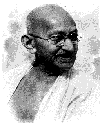 |
==Mohandas Karamchand Gandhi
(1869-1948)-- If the Mahatma hadn't existed, with all
his multifarious political-cum-religious views and
activities, could anybody possibly have invented him?
Study materials: *Columbia
Univ.*. (*Routes*) |
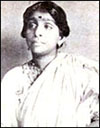 |
==Sarojini Naidu
(1879-1949)-- A child prodigy, poet, and activist
for Indian independence, she becomes the first Indian-- and the first woman--
to serve as governor of the United Provinces (1947-49).
Her poetry, translated from the Bengali, is first
published in "The Golden Threshold" (c.1905) (*Project Gutenberg*; *Arthur
Symons*). Further discussion: *howlingpixel*. |
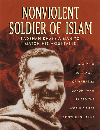 |
==Abdul Ghaffar Khan, the "Frontier
Gandhi" (1891-1988) is one of Gandhi's
closest kindred spirits. Against great odds, his Pathan
"Red Shirts" remain staunch allies of Congress, devoted
to nationalism and social service; against their own
tribal traditions, they consistently honor their pledge
of nonviolence (*progressive*; *Rahimullah Yusufzai*). (*Routes*) |
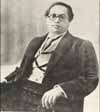 |
==Dr. B. R. Ambedkar
(1891-1956), is a preeminent Dalit leader and anti-caste
activist (*ambedkar.org*),
the chief framer of the Constitution of India, a
prolific writer and speaker, a convert to Buddhism,
and--last but not least--a Ph.D. of whom we at Columbia
are particularly proud (*Columbia Univ.*). (*Routes*) |
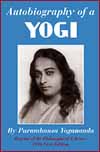 |
==Paramahansa Yogananda's
"Autobiography of a Yogi" (1946) matter-of-factly
describes (among other phenonema) a remarkable number of
supernatural yogic feats allegedly performed by the
author's guru, Shri Yukteshwar Giri (*crystal clarity*) .
Yogananda comes from a middle-class Bengali family, is
fluent in English, and has many American students; his
teaching of "self-realization" through yoga acquires
thousands of followers around the world (*Self-Realization
Fellowship*).
|
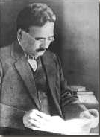 |
==Sir Muhammad Iqbal
(1877-1938): The great Urdu (and Persian) poet and
philosopher, known as the father of Pakistan (*Iqbal
Academy*), also seeks to reimagine Islam, in his
major work "On the Reconstruction of Religious Thought
in Islam" (*allama iqbal*). If you know Urdu,
you'll enjoy this treatment of "Khizr-e rah": *youtube*. More on Iqbal: *Columbia
Univ.*. (*Routes*) |
 |
==Independence and Partition, 1947: This
rough division rips through the fabric of time, space,
and community-- and creates, at the cost of millions of
lives, two new independent nations, India and Pakistan.
Discussion: *sacweb*; *Manas*; *BBC*; *Legacy Project* (especially for
paintings); filmclips from *Harappa*; the experience of Dr.
Zakir Husain: *Outlook* or *CU*. (*Routes*) |
 |
==Nirad Chaudhuri
(1897-1999), the ultimate "gadfly on the rump of the
state," publishes his acerbic "Autobiography of an
Unknown Indian" (1951), which has delighted readers ever
since, and which marks the beginning of a major literary
career. Discussion: *Stanford U.*; *Ramachandra Guha*; *rediff*. |
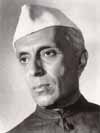 |
==Jawaharlal Nehru (1889
-1964) is Gandhi's anointed protege, though his vision
of the world could hardly be more different. The Nehru
dynasty, running from Motilal through Jawaharlal to
Indira Nehru Gandhi to Rajiv and Sonia and the next
generation, is India's closest thing to a royal family.
Nehru's influence on his country, and the world, has
been incalculable (*Internet Sourcebook*; *Harappa*; *BBC*; *E. A. Vas*). |
 |
==Abul Kalam Azad
(1888-1958): Azad is a traditionally educated Muslim
journalist and scholar; his vision of a common
Indianness shared by Hindu and Muslim alike makes him a
loyal Congress activist (and sometime Congress
president) for his whole highly influential life.
Discussion: *Manas*; *Mushirul Hasan*. (*Routes*) |
 |
==Bangladesh is born (1971-72):
To make a single nation out of two widely-separated (and
very different) halves was perhaps a hopeless project
from the start. Increasingly serious political conflicts
finally result in West Pakistan's invasion of East
Pakistan, India's military intervention, and the rebirth
of East Pakistan as the new nation of Bangladesh.
Discussion: *Naeem Mohaiemen*; *Virtual Bangladesh*; see also *Bangladesh Virtual Library*. |
 |
== Nek Chand's rock garden in Chandigarh
is opened (1976) to the public after years of work, as
his own unique creation made from scrap materials,
imagination, folk art, and personal devotion: *Nek
Chand Foundation*. Someday I'm going to go to
Chandigarh to see it. Photos: *Dey Alexander* |
 |
==The Babri Masjid is destroyed,
1992: In the case of Ayodhya, as so often in South Asian
history, the real reasons for "religiously motivated"
acts of temple- and mosque-destruction are in fact
highly political ones. General discussion: *Columbia Univ.* |
 |
==Visions of South Asia
nowadays include, as they always have, both realities
and fantasies. Discussion: *Mohsin Hamid*; *Philip Lutgendorf*; "Jai Kali
Karachi Vali" (*Outlook* or *CU*); *Behind the Veil*; *sawnet*;
*Manushi*. (*Routes*) |
|
|
|
|



















